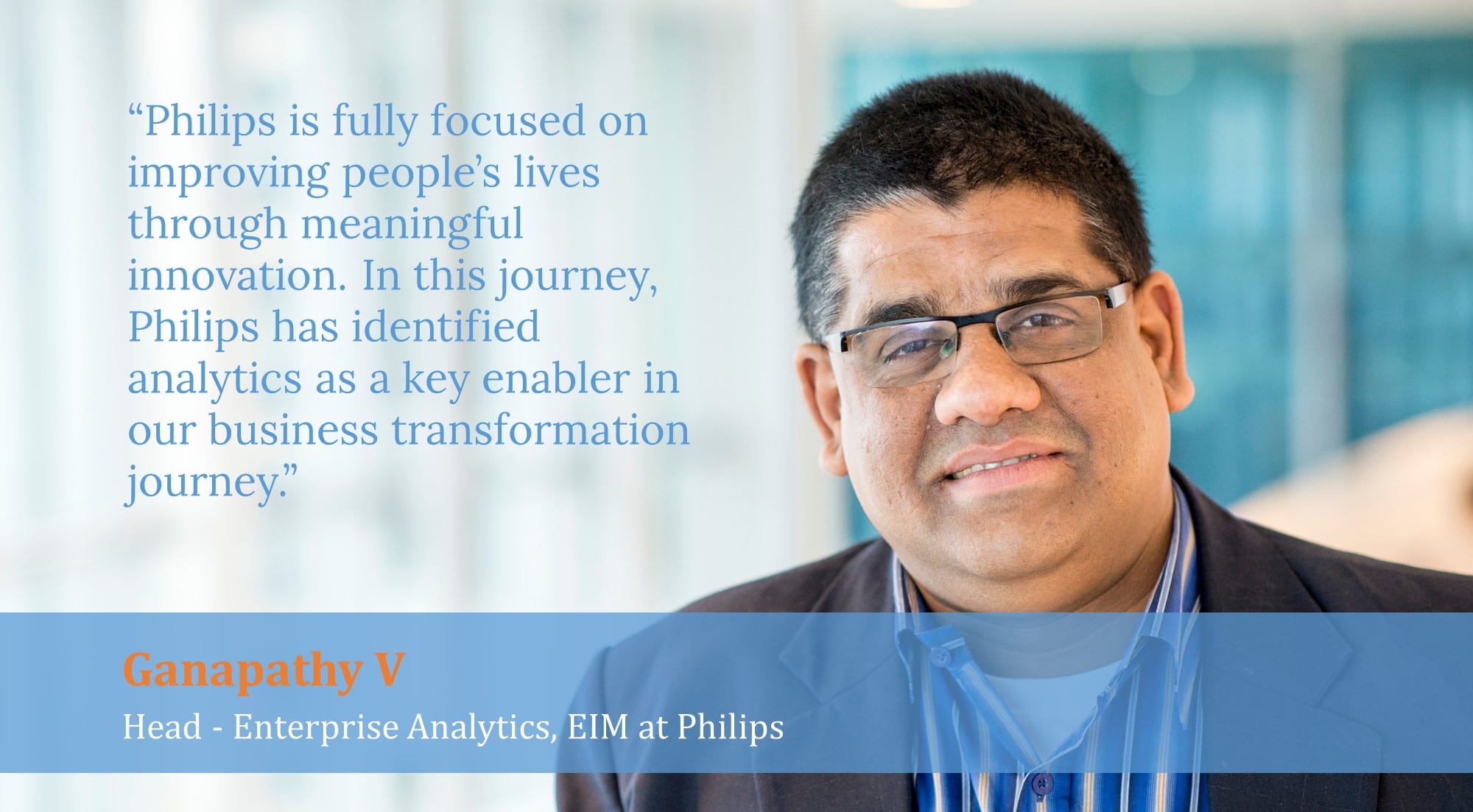Philips is a 124 year old company with a diverse business portfolio. They deliver healthcare and lighting technologies and services as well as innovative locally relevant consumer products that make a real difference to customers, consumers and stakeholders across the globe.
Although Philips offers a wide range of products and relevant services, it is a data-driven company. Their MRI solutions for example are actually advanced data collection systems. There is a greater emphasis on data so the radical architectural decision has been made to remove the data from the applications and save it in an unstructured store, from where data can then be streamed. Defining and establishing a robust enterprise level data strategy is key to success.
A few years ago with a purpose of unleashing the power of data, Philips created a group level function called Enterprise Information Management (EIM). EIM powers Philips globally by leveraging insights from data and ensuring a single trusted source of truth. Their enterprise analytics practice in EIM is chartered with “establishing analytics as a differentiator for Philips”.
Ganapathy {Gana} currently leads the Enterprise Analytics Practice for Philips Globally; as part of the Philips Group Level Business Transformation. In his role he is championing scaling up of ‘Analytics’ as a differentiating capability for Philips. He is responsible for Global delivery of Analytics services to all functions of Philips for their Consumer Lifestyle, Lighting, and Healthcare Business Units. Currently the Enterprise Analytics Practice in Philips has established CoEs (Center of Excellence) in- Sales Analytics, Supply Chain Analytics, Marketing Analytics, Healthcare Analytics, Enterprise Risk & Finance Analytics, Pricing Analytics, and Big Data Analytics. Prior to this role, he was part of the Philips Group CIO’s Office.
In an exclusive interview with Analytics India Magazine, Gana speaks about Philip’s enterprise analytics practice.
[dropcap size=”2″]AIM[/dropcap]Analytics India Magazine: Thanks Gana for accepting this invite to speak to our readers. To start with, can you brief us about Philips’ enterprise Analytics Practice?
[dropcap size=”2″]Gana[/dropcap]Ganapathy V: Our enterprise analytics team supports the world wide Philips organization for their various decision support needs.
Our analytics solutions span the entire spectrum of decision support needs- i.e., what’s going on in the business (holding the mirror”) -> identifying and managing the business drivers -> leveraging the past learnings to setting the business standards and goals -> predicting potential business outcomes -> enhancing and optimizing the business outputs and identifying business opportunities and risks.
As the analytics team, we support the Philips Sales teams to improve predictability in the opportunities funnel. We also support the Marketing and Finance teams with market sizing, segmentation, business performance management, and proactive identification of risks, our Operations Teams to improve our forecast reliability etc.
Philips is engaged in a worldwide business transformation and wants to take full advantage of the digital world: For example, Customers are increasingly buying products online and airing their wishes and expectations on social media, so with analytics we can tailor our solutions to suit our customers’ needs.
AIM: Why is analytics needed at Philips? When did Philips adopt analytics and what has been the benefits till date?
Gana: We believe in understanding people’s needs and desires. Philips is fully focused on improving people’s lives through meaningful innovation. In this journey, Philips has identified analytics as a key enabler in our business transformation journey. While we already had pockets of analytics in the organization; we created our enterprise analytics practice a couple of years back. Since then, we have been scaling up and establishing our centralized analytics capability.
We measure the ROI of analytics in terms of “business impact” and have an internal framework for quantifying the business impact jointly between the business & analytics teams. We have been able to demonstrate significant returns in the first year of inception itself and our journey has just begun!
AIM: What are the key differentiators in your analytical solutions?
Gana: Adapting to the dynamic requirements of our business decision support, decoupling the data challenges and managing them as noise variables, ability to bring in solutions for businesses in a frugal way, without calling for large investments (in infra) and adapting the framework of ‘global for local’ (i.e. while achieving harmonization at a Global level, ensuring the flexibility needed at a Market level).
AIM: How is the Philips’ enterprise Analytics Practice aligned to the business and what is the structure that you have adopted internally?
[pullquote]The EIM function in Philips is the Global powerhouse for anything and everything to do with our Data- data modeling, data management, digital services, reporting services and of course, enterprise analytics. [/pullquote]Gana: Our enterprise analytics practice as part of our EIM function is hosted with the Group level Business Transformation initiative. We have established practices in sales analytics, marketing analytics, supply chain analytics, finance & risk management analytics, pricing analytics, connected propositions analytics, healthcare analytics, big data analytics & visualization, etc. We have Practice Leads (CoE Leads) for each and within that we have Business Analysts, Data Scientists, Visualization Experts, Domain Experts, and Data Experts.
AIM: What are the planned next steps/ road ahead for analytics at Philips?
Gana: Continue evangelization of analytics, further integration of analytics into our way of working, harmonizing analytics delivery processes, further leveraging of analytics for enhanced value propositions for our customers, etc.
AIM: What kind of knowledge worker do you recruit and what is the selection methodology? What skill sets do you look at while recruiting in analytics?
Gana: I would say the best business insights get delivered when we have the following skills coming together:
Domain Experts: people with relevant domain experience (preferably multiple domains), bringing in outside-in views from across industries, strong business acumen & articulation skills.
Business Analysts: specialists who understand and talk the business language and analytics language, translate business to analytics & back, data savvy, attention to details and most importantly with great business articulation skills.
Data Scientists: Experts in one or many analytics tools, techniques, methodologies, advanced degrees in mathematics, statistics, with deep interests in data, algorithms development, innovation, etc.
Data Experts: People with Extraction, Transformation Loading expertise, translating data fields into business terminologies having automation expertise.
Visualization Experts: This is indeed emerging and getting more attention and people are realizing to treat this as a separate skill set .This is not just expertise in a visualization tool but the ability for visual story telling.
AIM: What are the most significant challenges you face being in the forefront of analytics space
Gana: One is how to get hold of the right data (for the analytics problem at hand) in the shortest possible time, ensuring that there is single version of truth and insights. Second, making sure that the business insights are getting delivered and consumed by the Business Managers in a simple and easy to understand manner. Three, embedding data based decision making and hence analytics into our way of working.
[quote]Finally, maintaining the optimal balance between being flexible and nimble to business queries and at the same time harmonizing the way we look at numbers and take decisions at a global level.[/quote]
AIM: How did you start your career in analytics?
Gana: Looking for fact based causations and patterns underlying various business symptoms is something I think I inherited since my 6 Sigma Black Belt-Master Black Belt days with Ford Motor CO. It was then a natural progression to the analytics world. I was fortunate to have worked in multiple functions of typical large MNC’s (project engineering/ manufacturing, supply chain, sales & operations planning, field sales (operations) quality, process engineering, business transformation, logistics, contact centers etc.) My learnings have been from my multi-domain experience which helps me to look across the organization while solving business problems and identifying opportunities.
AIM: How do you see analytics evolving today in the industry as a whole? What are the most important contemporary trends that you see emerging in the analytics space across the globe?
[pullquote align=”right”]Across organizations, people were using insights from data for decision making for many years. The realization is out there that there are synergies in getting the analytics forces together, depending on the maturity of consumption.[/pullquote]Gana: Disruptive trends in the Industry have proven the contemporary trends wrong!
Having said that, significant mind set changes have been happening to capture data driven opportunities. Over the years analytics has moved from providing business intelligence (mainly internal data) to deriving insights from smash ups of internal and external data (including big data) – to increasing the value propositions to customers using data. Different organizations are at different stages of maturity, depending upon the business, the industry they belong to and the market dynamics they operate in.
The convergence of S-M-A-C is offering irresistible business opportunities. Organizations who are early in the game have clear competitive advantage in the market place. Technology is less of a challenge in harnessing big data when compared to complying with regulations involving data privacy, etc. People have stopped talking about the internet of things as it has shifted to internet of everything.
I have seen sort of an s-curve-where it starts with analytics capabilities staggered across an organization followed by a consolidation at a central level where maturity gets accelerated. In the end it is getting hosted under respective business or functions.
While substantial internal analytics expertise is key, there is also an increased awareness and willingness of analytics outsourcing. Collaborating with the vendor eco system provides faster access to skills, learnings, and experience. It also shortens the mobilization time apart from the flexibility it brings in. According to a recent Mc Kinsey article, the analytics Industry is to become a USD 50B market by 2017.
AIM: Anything else you wish to add?
Gana: The best of analytics solutions can potentially bring in the best insights for a Business Manager or leader. But the power of analytics gets realized only when appropriate actions or interventions are taken by the decision makers. There are no easy substitutes for experienced hands to leverage their institutional knowledge and ability to navigate the business. I would say, when a business leader clubs insights from analytics with his or her business acumen, experience and intuitions, then we have the perfect ingredients for success!
[spoiler title=”Biography of Ganapathy V” style=”fancy” icon=”plus-circle”]
A professional with over 20 years of work experience spanning across Business functions (including Business Analytics, Supply Chain, Business Excellence & Quality, Process Engineering, Sales & Distribution); he has been with Organizations such as Dell, America Online, Ford Motor CO, and Ashok Leyland
With Dell, Gana led their Business Analytics Practices for multiple Functions Globally. He spearheaded Business Excellence activities for AOL’s multiple Business functions in India. With Ford, he led Business process improvement programs across multiple functional domains. He managed Project Engineering, Material Handling systems design functions while being with Ashok Leyland
He is a Certified 6 Sigma Master Black Belt from Ford Motor CO. (from 6 Sigma Academy, US), and also a Registered COPC Coordinator (COPC Inc). He has spear headed several Business Transformation Initiatives in the various Organizations he has worked with so far. Gana is a NLP (Neuro Linguistic Programming) Practitioner and trained in TRIZ (the Theory of Inventive Problem Solving)
Gana holds a MBA in Operations Management, B Tech in Mechanical Engineering, and a Diploma in Financial Management.[/spoiler]








































































































